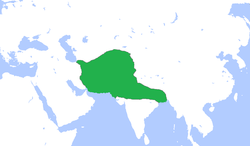Abu Ali ibn Muhammad
Abu Ali ibn Muhammad (Persian: ابو علی بن محمد) was the king of the Ghurid dynasty. He succeeded his father Muhammad ibn Suri in 1011, after the latter was deposed by Mahmud of Ghazni, who then sent teachers to teach about Islam in Ghor. Abu Ali was one of those who converted to Islam during that period. After his conversion to Islam from Buddhism,[1] he began constructing mosques and madrassas. In ca. 1035, Abu Ali was overthrown by his nephew Abbas ibn Shith.[2]
| Abu Ali ibn Muhammad | |
|---|---|
| Malik of the Ghurid dynasty | |
| Reign | 1011-1035 |
| Predecessor | Muhammad ibn Suri |
| Successor | Abbas ibn Shith |
| Born | Ghor |
| Died | 1035 |
| House | Ghurid |
| Father | Muhammad ibn Suri |
| Religion | Sunni Islam |
References
- Medieval India Part 1 Satish Chandra Page 22
- History of Civilizations of Central Asia, C.E. Bosworth, M.S. Asimov, p. 185.
Sources
- C. Edmund, Bosworth (2001). "GHURIDS". Encyclopaedia Iranica, Online Edition. Retrieved 5 January 2014.
- Bosworth, C. E. (1968). "The Political and Dynastic History of the Iranian World (A.D. 1000–1217)". In Frye, R. N. (ed.). The Cambridge History of Iran, Volume 5: The Saljuq and Mongol periods. Cambridge: Cambridge University Press. pp. 1–202. ISBN 0-521-06936-X.CS1 maint: ref=harv (link)
| Preceded by Muhammad ibn Suri |
Malik of the Ghurid dynasty 1011–1035 |
Succeeded by Abbas ibn Shith |
This article is issued from Wikipedia. The text is licensed under Creative Commons - Attribution - Sharealike. Additional terms may apply for the media files.
